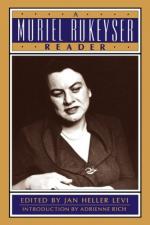|
This section contains 3,128 words (approx. 11 pages at 300 words per page) |

|
[In] the seventies, [we have come] to define Rukeyser as a poet far different from the one she has traditionally been assumed to be. The neglect her poetry has suffered has delayed recognition of her work as deeply rooted in the Whitman-Transcendental tradition.
Her belief in the unity of Being, her reliance on primary rather than on literary experience as the source of truth and the resultant emphasis on the self, the body and the senses, as well as the rhythmic forms and patterns that inevitably emerge from such beliefs, tie Rukeyser to her forebears in the nineteenth century. At the same time, through her highly personal contemporary voice, they project her into our era which, with its radical departures from traditional Transcendentalism, is yet a reaffirmation of it, with Rukeyser as one of its important figures.
Her desperate search for "identity"—in the Whitmanian sense—and for...
|
This section contains 3,128 words (approx. 11 pages at 300 words per page) |

|


